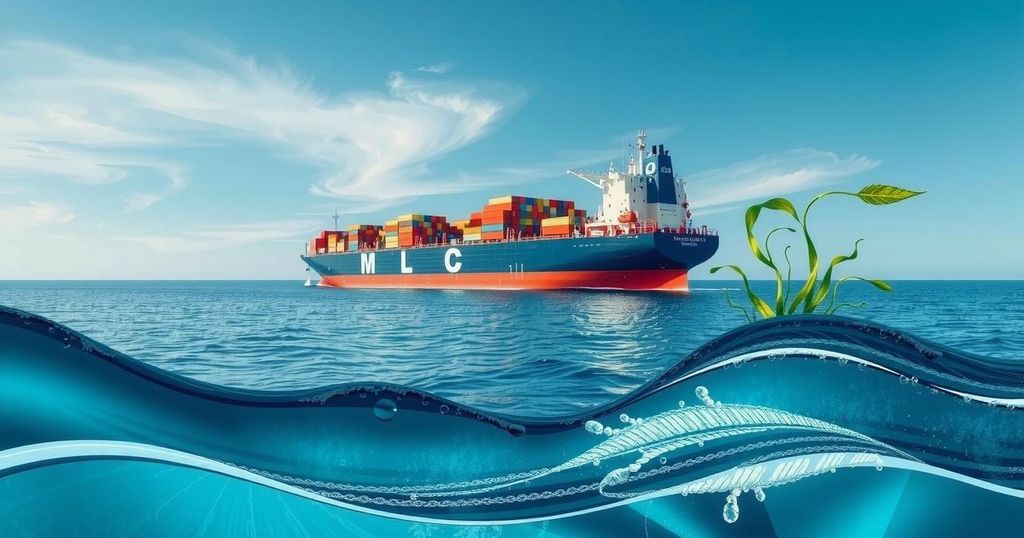Environmental Groups Urge IMO to Exclude Biofuels in Shipping Standards

Environmental groups have warned the IMO against using biofuels in shipping, asserting that it would exacerbate deforestation and climate change. They delivered an open letter advocating for the rejection of biofuels and for more stringent sustainability criteria, particularly highlighting Brazil’s significant role in the biofuel market. Campaigners stress the need for alternatives that prioritize environmental protection while aligning with the IMO’s climate goals.
Environmental organizations have urged the International Maritime Organization (IMO) to reject the use of biofuels in shipping, arguing that such a decision would lead to increased deforestation, land appropriation, and more severe climate change effects. Biofuelwatch, the Global Forest Coalition, and 65 other groups delivered an open letter to the IMO as it prepares to discuss a new low-carbon fuel standard. The letter emphasizes the environmental and social risks associated with biofuel expansion, especially in the Global South, advocating for more rigorous sustainability criteria.
A pressing concern articulated in the letter is Brazil’s advocacy for biofuels in the shipping sector. As the world’s second-largest biofuel producer, Brazil aims to be the foremost leader in this market. Additionally, Brazil is set to host the upcoming Conference of Parties (COP30) for the United Nations in November, which heightens the significance of its role in biofuel promotion.
Campaigners assert that rising biofuel demand will exacerbate the destruction of vital rainforests and farmland necessary for food production. Almuth Ernsting of Biofuelwatch cautioned that if the IMO endorses biofuels as a legitimate ‘low-carbon fuel,’ it would accelerate climate change while compromising rainforest and land resources.
Maria Emília Pacheco, an advisor with the Brazilian NGO FASE, expressed concerns that promoting biofuels could endanger food security. She stated that increasing biofuel production to meet IMO-driven demand would threaten lands pivotal for food production amid hunger and critical shortages affecting Brazil and other nations in the Global South.
In 2023, the IMO committed to achieving Net Zero greenhouse gas emissions from the shipping sector by 2050. Part of this commitment involves creating a Global Fuel Standard (GFS) to incentivize cleaner fuel usage. However, advocates argue that including biofuels in this framework will undermine the IMO’s climate objectives.
Oli Munnion of the Global Forest Coalition emphasized that endorsing biofuels under the GFS could jeopardize the IMO’s climate ambitions. He stressed that the GFS should be based on stringent life cycle assessment guidelines that prohibit biofuels, hence safeguarding both the climate and community livelihoods.
The letter further calls upon the IMO to explore alternative approaches, such as reducing shipping demand, enhancing energy efficiency, and investing in advanced propulsion technologies, including wind-assisted propulsion and electrification. The biofuel sector’s negative impact on ecosystems and communities is a cause for alarm, as it already accounts for a considerable portion of environmental degradation.
Souparna Lahiri, Senior Policy Advisor for Climate and Biodiversity at GFC, warned that the upcoming decisions by the IMO could either foster sustainable progress in shipping fuels or exacerbate global crises. He remarked that the biofuel industry’s pervasive greenwashing cannot obscure its destructive impacts.
As the IMO’s Marine Environment Protection Committee (MEPC 83) convenes in April, stakeholders stress the urgency of excluding biofuels from the Global Fuel Standard. This exclusion would demonstrate alignment with the IMO’s climate commitments while simultaneously protecting vulnerable ecosystems and communities.
Almuth Ernsting concluded by asserting that the shipping industry has the potential to make principled choices moving forward. She reiterated that genuine solutions exist to safeguard both the environment and humanity—the IMO must prioritize these over misleading promises.
In summary, environmental groups have expressed strong opposition to the inclusion of biofuels in shipping, citing significant risks such as deforestation, land grabbing, and climate change. They have urged the IMO to adopt more stringent sustainability criteria, emphasizing that biofuels could detract from achieving the IMO’s greenhouse gas emission reduction goals. Alternatives aimed at improving efficiency and reducing demand are advocated instead, ensuring protection for essential ecosystems and communities. The outcomes of the upcoming IMO discussions will be pivotal in determining the sustainability of shipping fuels.
Original Source: www.downtoearth.org.in






